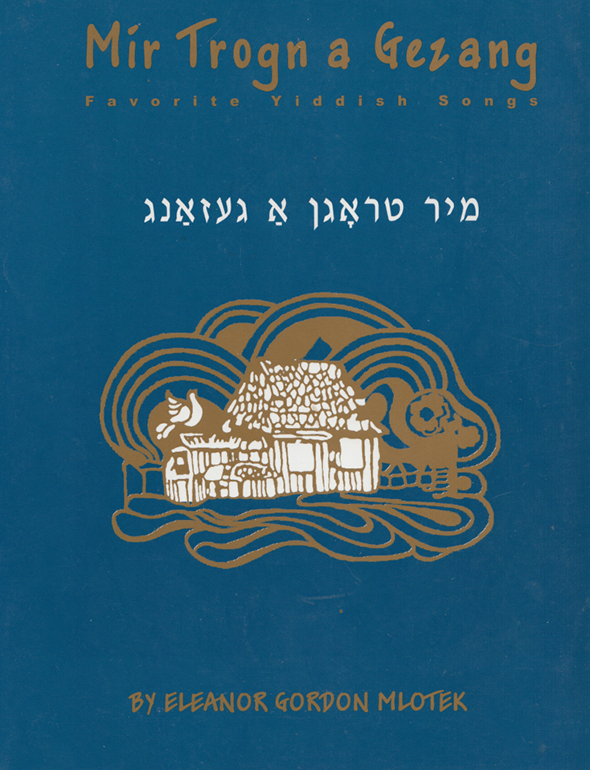Variant of a song attributed to Yosele Kolodny (killed by the Nazis, 1942).

The Rebbe stands up from the table
gives a sign to the gabbai Shepsl,
and the Hasidim cheerful and fresh,
after their prodigious drink.
A tune is struck, oh, a tune
with ecstatic fervor.
Everyone sings, everyone dances,
as they all are able.
Who is worrying now, who is filled with care,
all downheartedness is gone.
When you are at the Rebbe’s place,
God will soon give…
who is there to be afraid of?
The Hasidim sing, the Hasidim leap,
braiding themselves into a line;
passing by a bit at a time,
lifting their feet
in a truly impressive dance.
Their faces framed with peyes, beards and fur hats,
their legs in socks and slippers,
they dance on and on,
bursting into song, they keep going
and clapping their hands
ay-ay-ay, ay-ay-ay,
and clapping their hands.
Reb Borukhl stands up,
to heck with the poverty in the house.
He has troubles without end,
better not to ask.
He has seven daughters,
not one of them is married.
And if a bridegroom doesn’t show up,
they’ll all keep getting older.
Der rebe shtelt zikh oyf baym tish,
Git a vunk tsum gabe Shepsl
Un di khasidimlekh munter, frish,
Nokh dem vazhnem shnepsl.
Men derlangt a nign, oy, a nign
Mit hislayvesdikn bren.
Ale zingen, ale tantsn,
Vi yeder eyner ken.
REFRAIN:
Ver dayget itst, ver zorgt den itst,
S’avek di more-shkhoyre.
Az men zitst baym rebn,
lz got vet shoyn gebn. . .
Far vemen hot men moyre?
Khasidimlekh zingen, khasidimlekh shpringen,
Me flekht zikh arayn in a krentsl;
Begilufnkid tsu bislekh,
Heybn mit di fislekh,
Gor a vazhne tentsl.
Di penimlekh bapeyete, baberdlte, bashtraymlte,
Di fiselekh in zokn un in latshn.
Tantsn zey farhayete,
Tsezungene, farshmayete,
Un di hentlekh patshn.
Ay-ay-ay, ay-ay-ay,
Un di hentlekh patshn.
Shtelt zikh oyf reb Borukhl,
In shtub es fayft der dales.
Tsores hot er on a shir,
Fregt shoyn nit keyn shayles.
Hobn hot er zibn tekhter —
Keyn eyne nit keyn kale.
Un az es kumt nit der basherter,
Eltern zey zikh ale.
– דער רבי שטעלט זיך אױף בײַם טיש,
גיט אַ װונק צום גבאי שעפּסל,
און די חסידימלעך מונטער, פֿריש,
נאָך דעם װאַזשנעם שנעפּסל.
מען דערלאַנגט אַ ניגון
מיט התלהבֿותדיקן ברען.
אַלע זינגען, אַלע טאַנצן,
װי יעדער אײנער קען.
רעפֿרײן:
װער דאגהט איצט, װער זאָרגט דען איצט,
ס’אַװעק די מרה-שחורה.
אַז מען זיצט בײַם רבין,
איז גאָט װעט שױן געבן. . .
פֿאַר װעמען האָט מען מורא?
חסידימלעך זינגען, חסידימלעך שפּרינגען,
מען פֿלעכט זיך אַרײַן אין אַ קרענצל;
בגילופֿנדיק צו ביסלעך, י
הײבן מיט די פֿיסלעך,
גאָר א װאַזשנע טענצל.
די פּנימלעך באַפּאהטע, באַבערדלטע, באַשטרײַמלטע,
די פֿיסעלעך אין זאָקן און אין לאַטשן,
טאַנצן זי פֿאַרהײַעטע, צעזונגענע, פֿאַרשמײַעטע,
און די הענטלעך פֿאַטשן .
אײַ–אײַ–אײַ, אײַ–אײַ–אײַ,
און די הענטלעך פּאַטשן.
שטעלט זיך אױף ר׳ ברוכל,
אין שמוב עס פֿײַפֿט דער דלות.
צרות האָט ער אַן אַ שיעור,
פֿרעגט שױן ניט קײן שאלות.
האָבן האָט ער זיבן טעכטער —
קײן אײנע ניט קײן כּלה,
און אַז עס קומט ניט דער באַשערטער––
עלטערן זײ זיך אַלע.
Song Title: Khasidimlekh

First published in 1972, Mir Trogn A Gezang: Favorite Yiddish Songs was reprinted six more times (in 1977, 1982, 1985, 1987, 1988, 2000) due to popular demand. The songs in this anthology represent a sampling of beloved folk and well-known Yiddish songs, many of which are scattered in various song collections; some appear in very rare and inaccessible collections; and some were never before published. Folk songs comprise about a third of this volume and were selected mainly on the basis of popularity and sometimes for their historic significance. Needless to say, they are only representative of the vast, rich treasure of Yiddish folk material. The selection was made not only on the basis of personal preference, but in the knowledge they are favorites of many who sing these songs. Most of the songs represent the repertoire that was sung at Yiddish summer camps, May 1st demonstrations and at social gatherings. Many songs were introduced to American Jewry by Jewish immigrants who came to the United States after World War II, for whom these songs had been favorites in Poland and other East European communities destroyed by the Nazis.